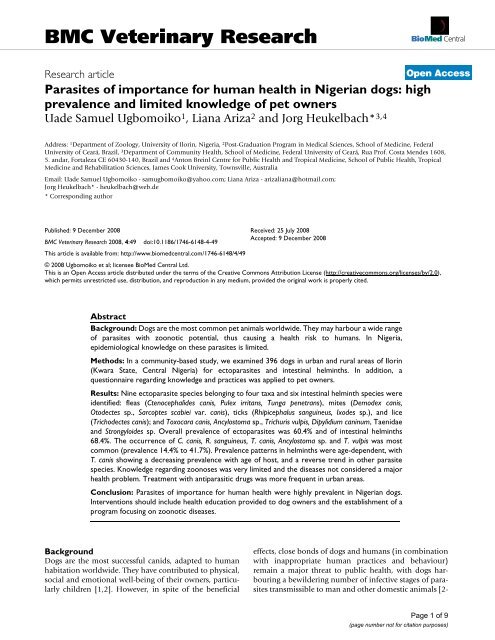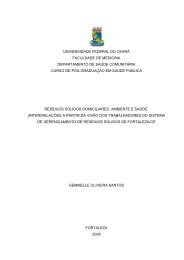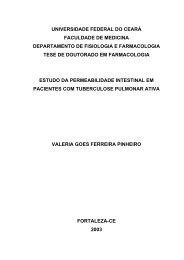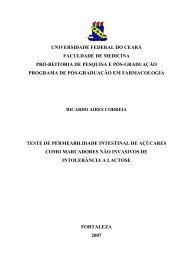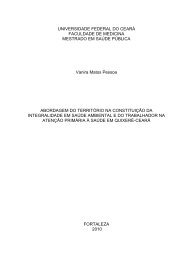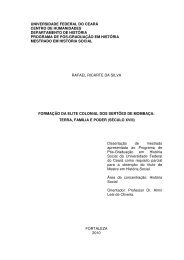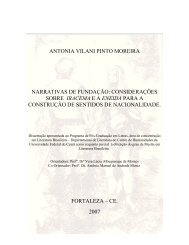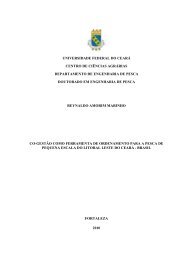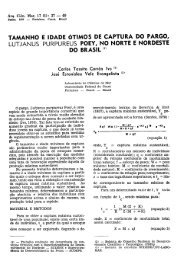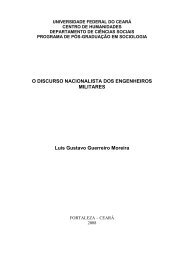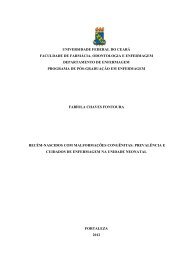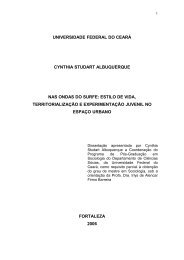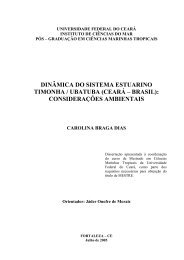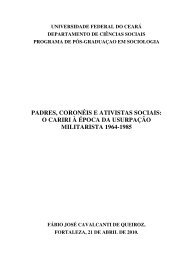Tungíase: doença negligenciada causando patologia grave
Tungíase: doença negligenciada causando patologia grave
Tungíase: doença negligenciada causando patologia grave
You also want an ePaper? Increase the reach of your titles
YUMPU automatically turns print PDFs into web optimized ePapers that Google loves.
BMC Veterinary Research<br />
Research article<br />
Parasites of importance for human health in Nigerian dogs: high<br />
prevalence and limited knowledge of pet owners<br />
Uade Samuel Ugbomoiko1 , Liana Ariza2 and Jorg Heukelbach* 3,4<br />
BioMed Central<br />
Open Access<br />
Address: 1 Department of Zoology, University of Ilorin, Nigeria, 2 Post-Graduation Program in Medical Sciences, School of Medicine, Federal<br />
University of Ceará, Brazil, 3Department of Community Health, School of Medicine, Federal University of Ceará, Rua Prof. Costa Mendes 1608,<br />
5. andar, Fortaleza CE 60430-140, Brazil and 4Anton Breinl Centre for Public Health and Tropical Medicine, School of Public Health, Tropical<br />
Medicine and Rehabilitation Sciences, James Cook University, Townsville, Australia<br />
Email: Uade Samuel Ugbomoiko - samugbomoiko@yahoo.com; Liana Ariza - arizaliana@hotmail.com;<br />
Jorg Heukelbach* - heukelbach@web.de<br />
* Corresponding author<br />
Published: 9 December 2008<br />
BMC Veterinary Research 2008, 4:49 doi:10.1186/1746-6148-4-49<br />
This article is available from: http://www.biomedcentral.com/1746-6148/4/49<br />
Abstract<br />
Background: Dogs are the most common pet animals worldwide. They may harbour a wide range<br />
of parasites with zoonotic potential, thus causing a health risk to humans. In Nigeria,<br />
epidemiological knowledge on these parasites is limited.<br />
Methods: In a community-based study, we examined 396 dogs in urban and rural areas of Ilorin<br />
(Kwara State, Central Nigeria) for ectoparasites and intestinal helminths. In addition, a<br />
questionnaire regarding knowledge and practices was applied to pet owners.<br />
Results: Nine ectoparasite species belonging to four taxa and six intestinal helminth species were<br />
identified: fleas (Ctenocephalides canis, Pulex irritans, Tunga penetrans), mites (Demodex canis,<br />
Otodectes sp., Sarcoptes scabiei var. canis), ticks (Rhipicephalus sanguineus, Ixodes sp.), and lice<br />
(Trichodectes canis); and Toxocara canis, Ancylostoma sp., Trichuris vulpis, Dipylidium caninum, Taenidae<br />
and Strongyloides sp. Overall prevalence of ectoparasites was 60.4% and of intestinal helminths<br />
68.4%. The occurrence of C. canis, R. sanguineus, T. canis, Ancylostoma sp. and T. vulpis was most<br />
common (prevalence 14.4% to 41.7%). Prevalence patterns in helminths were age-dependent, with<br />
T. canis showing a decreasing prevalence with age of host, and a reverse trend in other parasite<br />
species. Knowledge regarding zoonoses was very limited and the diseases not considered a major<br />
health problem. Treatment with antiparasitic drugs was more frequent in urban areas.<br />
Conclusion: Parasites of importance for human health were highly prevalent in Nigerian dogs.<br />
Interventions should include health education provided to dog owners and the establishment of a<br />
program focusing on zoonotic diseases.<br />
Background<br />
Dogs are the most successful canids, adapted to human<br />
habitation worldwide. They have contributed to physical,<br />
social and emotional well-being of their owners, particularly<br />
children [1,2]. However, in spite of the beneficial<br />
Received: 25 July 2008<br />
Accepted: 9 December 2008<br />
© 2008 Ugbomoiko et al; licensee BioMed Central Ltd.<br />
This is an Open Access article distributed under the terms of the Creative Commons Attribution License (http://creativecommons.org/licenses/by/2.0),<br />
which permits unrestricted use, distribution, and reproduction in any medium, provided the original work is properly cited.<br />
effects, close bonds of dogs and humans (in combination<br />
with inappropriate human practices and behaviour)<br />
remain a major threat to public health, with dogs harbouring<br />
a bewildering number of infective stages of parasites<br />
transmissible to man and other domestic animals [2-<br />
!"#$%&%'(%)<br />
!"#$%&'()*%+&',-&.,+&/0-#-0,'&"(+",1%12


